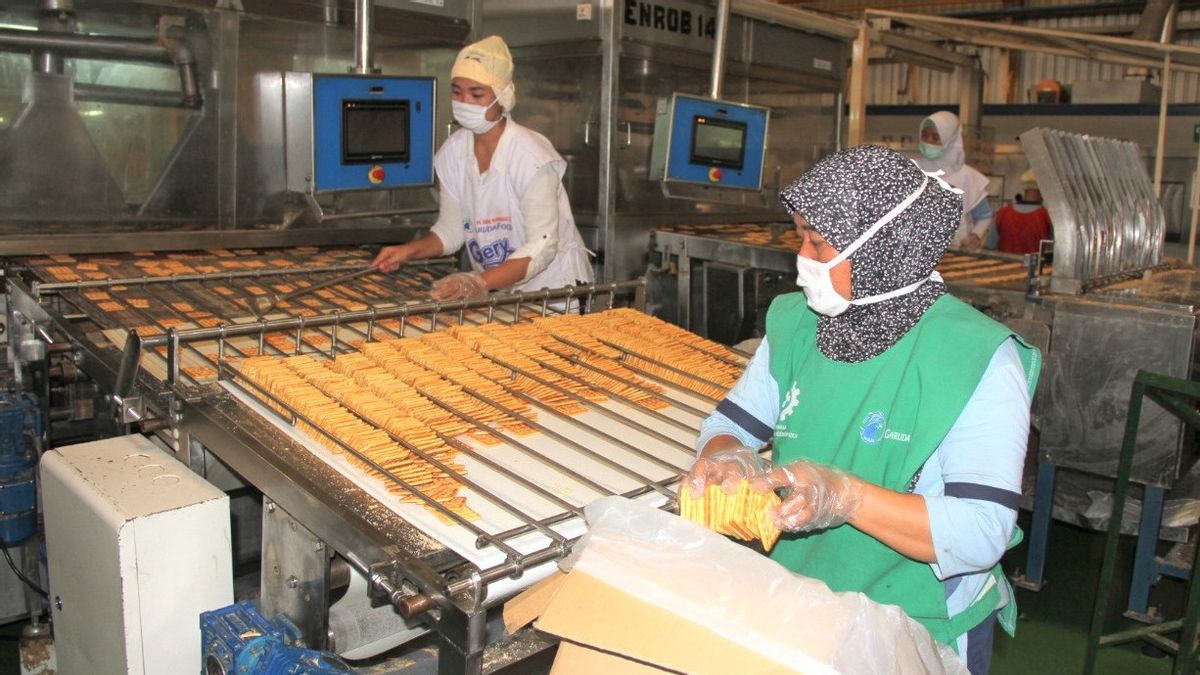JAKARTA - The industrial sector still contributes significantly to the structure of the national Gross Domestic Product (GDP), amounting to 19.98 percent in the first quarter of 2020. The vital role of this sector can still be spurred despite the pressure from the impact of the coronavirus pandemic or COVID-19.
Seeing the GDP figures, the Ministry of Industry (Kemenperin) is determined to spur the performance of the industrial sector so that it continues to drive the wheels of the economy. Various policies have also been rolled out, so that manufacturing operations continue to run in compliance with health protocols.
Director General of the Chemical, Pharmaceutical and Textile Industry (IKFT) of the Ministry of Industry Muhammad Khayam admitted that he had carried out a mapping of industrial sectors that were hit by the COVID-19 pandemic. Of the many sectors affected, there are some sectors that still have high demand so that they can strengthen the trade balance.
Khayam said that the mapping starts from the small, medium to large-scale industrial sector. He said 60 percent of the industry was at the severely affected level. Meanwhile, the other 40 percent, the industries are moderate and have high demand.
"This will certainly put pressure on industrial growth," he said, in a virtual joint meeting with Commissions VII, VI and IX, Tuesday, May 5.
Based on data from the Central Statistics Agency (BPS), the growth of the non-oil and gas processing industry stood at 2.01 percent throughout the first quarter. This had an impact on the national economy which was only able to grow 2.97 percent.
Meanwhile, a number of Indonesia's trading partner countries also contracted as a result of activity restrictions and lockdowns to control the spread of COVID-19.
"China's economic growth slumped to -6.8 percent in the first quarter of this year. Furthermore, the United States fell 0.3 percent, Singapore -2.2 percent, South Korea 1.3 percent, Hong Kong -8.9 percent, and the Union. Europe -2.7 percent, "he explained.
Khayam said that the manufacturing sector currently still has a high demand in the market, especially the food and beverage industry. In addition, industries related to the health sector, such as the Personal Protective Equipment (PPE) industry, the medical equipment and ethanol industry, the mask and glove industry, as well as the pharmaceutical and phyto-pharmaceutical industries also have high demand.
Referring to the BPS report, continued Khayam, several sectors of the non-oil and gas processing industry still recorded positive performance during the first three months of this year. Among these sectors are the chemical, pharmaceutical and traditional medicine industries which grew by 5.59 percent, then the transportation equipment industry with 4.64 percent, and the food and beverage industry with 3.94 percent.
Meanwhile, continued Khayam, the sectors that were hardest hit included the automotive, metal, cable and electrical equipment industries, cement, ceramics, glass, rubber, machinery, heavy equipment, electronics and communications equipment, textiles, and furniture and handicrafts.
"The ones that have been moderately affected are the petrochemical industry, the plastic industry and the pulp industry," he said.
Improve the Affected Industries
Khayam explained the problems faced by a number of industries today, namely, contract delays and order cancellations, decreased production, decreased sales, and reduced demand.
"In addition, there were layoffs (layoffs) due to a reduction in employees due to a decrease in production capacity," he said.
Not only that, continued Khayam, another problem that hinders this sector is the difficulty in obtaining supporting raw materials due to rising prices and limited access to imported countries. Because of this, the Ministry of Industry is preparing solutions to improve the performance of a number of industries.
First, in the agro industry sector, the Ministry of Industry will coordinate to meet the raw material needs for the agro industry due to the impact of COVID-19.
Second, facilitate and coordinate the absorption of domestic agro-industrial products. Third, facilitation and simplification of industrial metered exports.
Then, continued Khayam, in the chemical, pharmaceutical and textile industry there are three plans to be carried out by the Ministry of Industry. First, it will identify the ability to produce basic materials for making personal protective equipment or PPE, masks and gloves.
Second, continued Khayam, the Ministry of Industry will procure machines or equipment to increase the production of standardized herbal or herbal raw materials.
Third, verification of PPE and mask raw material manufacturers and verification of supply chain and business matching with producers.
In the metal, machinery, transportation equipment and electronics industry sector, the Ministry of Industry will develop a disaster emergency management application. Then, facilitate the handling of the machining industry affected by COVID-19 and the development of the national ventilator industry, as well as industrial assistance affected by the spread of COVID-19 in obtaining industrial raw materials.
Furthermore, Khayam said, in the small, medium and various industrial sectors, the Ministry of Industry would develop small and medium-sized industrial entrepreneurs (IKM) with a target of creating 4,365 entrepreneurs. Then, develop IKM centers affected by COVID-19 by facilitating 22 IKM centers for raw and auxiliary materials.
According to Khayam, the Ministry of Industry will also restructure IKM machines affected by COVID-19 with a target for 41 IKM and development of IKM products affected by COVID-19 with a target of 50 IKM products.
The English, Chinese, Japanese, Arabic, and French versions are automatically generated by the AI. So there may still be inaccuracies in translating, please always see Indonesian as our main language. (system supported by DigitalSiber.id)













